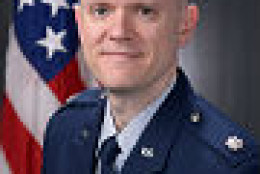On DoD
-
The Air Force and Northrop Grumman have a new deal in place. They're calling it a public-private partnership, and it will enable Northrop Grumman to provide the Air Force with sustainment of future weapon systems. Air Force officials say they hope the deal will improve efficiency, both in negotiations and in implementing future projects. Dr. Chris Jones, the president of Northrop Grumman Technical Services, joined Tom Temin on the Federal Drive with more on the partnership and how it works.
April 01, 2015 -
The newest edition of the Virtual Enterprise Service Desk is now active on the desktops of airmen all across the Air Force. Version 2.0 includes capabilities that will make users more self-reliant, which will save the Air Force money. Lt. Col. Mark Reith, commander of the 690th Network Support Squadron, tells In Depth with Francis Rose how airmen will find some new power when they click on the vESD icon on their desktops.
March 27, 2015 -
The Department of the Navy plans to use one of the three projects in its Innovation Cell to create data analytics for talent management. The goal of the cell is to rapidly acquire commercial IT by involving industry early in the requirements process.
March 27, 2015 -
The Navy is in the middle of a long push to overhaul its personnel practices. Navy officials think those practices are too rigid, and that they're based on concepts of talent management that are really outdated. Officials want new data analytics capabilities to help determine what's good and bad about the current system, and they're asking industry for help. Federal News Radio DoD Reporter Jared Serbu has the details.
March 26, 2015 -
Lt. Col. Andrea deCamara, chief of the Air Force Legal Operations Agency's Special Victims Counsel Division, said victim empowerment is extremely important. "The conviction is not what we'd like to focus on for the victim; it's empowering the victim to be able to make informed choices," she told Federal News Radio's Agency of the Month radio show.
March 26, 2015 -
In our latest online chat, Doug Wiltsie, head of the Army's Program Executive Office Enterprise Information Systems, discusses budget pressures, the move to agile development, acquisition innovation and cyber, among other topics.
March 24, 2015 -
Navy officials plan an industry day to formally launch a new framework for IT procurement, designed to work within the existing acquisition system to much more rapidly insert commercial technologies into Navy networks.
March 24, 2015 -
Larry Allen, president of Allen Federal Business Partners, joins host Mark Amtower to discuss the top procurement issues in 2015, and how they are impacting contractors. March 23, 2015
March 23, 2015 -
Assistant Secretary of the Navy Sean Stackley tells the Senate Armed Services Subcommittee on Seapower that out of eight shipyards in the United States, half are one contract away from being what he calls "not viable." Bryan Clark, senior fellow for the Center for Strategic and Budgetary Assessments, tells In Depth with Francis Rose about the health of the maritime contracting industry.
March 23, 2015 -
When the Obama administration released its 2016 budget request last month, it left some areas sort of blank. Case in point: The IT spending details for the Navy and Army, two of the biggest technology spenders in the government. Bloomberg Government analysts raided the IT dashboard this month to find some of the missing data. Bloomberg quantitative analyst Jesse Holler joined Tom Temin on the Federal Drive with a clearer picture of Army and Navy IT plans.
March 23, 2015 -
At the end of last year, Congress ordered up a new commission to study the Army's future. We now know who will serve on that eight-member study panel.
March 23, 2015 -
As one of the military's highest-ranking women and its first openly gay general, Brig. Gen. Tammy Smith, has a busy speaking calendar, especially around this time of year. It's women's history month. Smith is the deputy chief of staff of the Army Reserve, which prides itself on having women in 95 percent of its occupations. Federal News Radio Reporter Emily Kopp asked Smith whether she thought the Army Reserve was more welcoming to women than other parts of the military.
March 19, 2015 -
Cyber déjà vu can happen when the same or similar cyber attacks hit multiple agency networks. But cyber déjà vu can be a good thing if your agency looks at the problem in a different way. That's according to Greg Boison, director of Homeland Cybersecurity at Lockheed Martin. On In Depth with Francis Rose, he shared three ways to take advantage of cyber déjà vu to turn your agency's strategy from reactive to proactive.
March 19, 2015 -
Two priorities shape the way the United States Army will drive its business: Warfighting and enterprise information environment mission areas. Those priorities are more important in an Army where human power, and budget, is getting smaller. Doug Wiltsie is program executive officer for Enterprise Information Systems for the Army. On In Depth with Francis Rose, Doug laid out three priorities for 2015 and he says the first one is uninterrupted capability delivery.
March 18, 2015 -
Dr. Mica Endsley, chief scientist of the Air Force, works to combat cyber concerns. "I would prioritize defense of our computer systems to be probably among the highest priorities that we have today," she tells Federal News Radio's Agency of the Month radio show.
March 18, 2015











